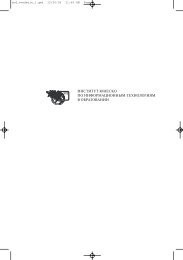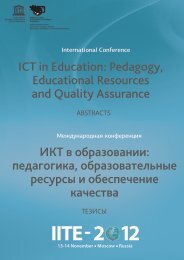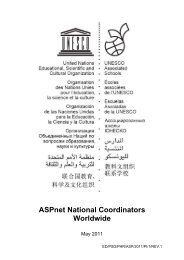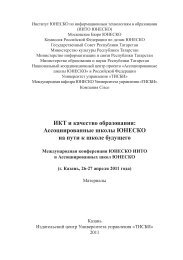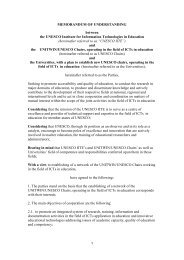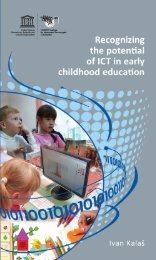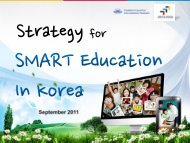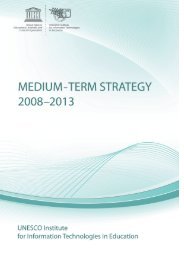UNESCO ICT Competency Framework for Teachers ... - unesco iite
UNESCO ICT Competency Framework for Teachers ... - unesco iite
UNESCO ICT Competency Framework for Teachers ... - unesco iite
You also want an ePaper? Increase the reach of your titles
YUMPU automatically turns print PDFs into web optimized ePapers that Google loves.
APPENDIX 1: <strong>UNESCO</strong> <strong>ICT</strong> TEACHER COMPETENCY FRAMEWORK MODULES<br />
Technology Literacy<br />
OBJECTIVES<br />
TEACHERS SHOULD BE ABLE TO<br />
TL.4.j. Use networked record keeping software to<br />
take attendance, submit grades, and maintain student<br />
records.<br />
TL.4.k. Use common communication and collaboration<br />
technologies, such as text messaging, video<br />
conferencing, and web-based collaboration and social<br />
environments.<br />
TL.5.a. Integrate the use of a computer laboratory into<br />
ongoing teaching activities.<br />
TL.5.b. Manage the use of supplemental <strong>ICT</strong> resources<br />
with individuals and small groups of students in<br />
the regular classroom so as not to disrupt other<br />
instructional activities in the class.<br />
TL.5.c. Identify the appropriate and inappropriate<br />
social arrangements <strong>for</strong> using various technologies.<br />
TL.6.a. Use <strong>ICT</strong> resources to enhance their<br />
productivity.<br />
TL.6.b. Use <strong>ICT</strong> resources to support their own<br />
acquisition of subject matter and pedagogical<br />
knowledge.<br />
EXAMPLE METHODS (FOR TEACHER<br />
EDUCATION OR PROFESSIONAL LEARNING)<br />
Discuss the purposes and advantages of a networked<br />
recording keeping system, demonstrate the use of such<br />
a system, and have participants enter record keeping<br />
data <strong>for</strong> their class.<br />
Discuss the purposes and advantages of various<br />
communication and collaboration technologies;<br />
and have participants use these technologies to<br />
communicate and collaborate with others in the group.<br />
Discuss and give examples of different ways that<br />
computer laboratories (or a set of classroom laptops)<br />
can be used to supplement classroom teaching; have<br />
participants create lesson plans that include the use of<br />
computer laboratory activities<br />
Discuss and give examples of different ways<br />
that limited classroom <strong>ICT</strong> resources can be use<br />
by individual students, pairs, or small groups to<br />
supplement teaching; have participants create lesson<br />
plans that include the use of <strong>ICT</strong> to supplement<br />
classroom teaching.<br />
Identify different hardware and software technologies<br />
and discuss corresponding social arrangements<br />
appropriate <strong>for</strong> their instructional use, such individuals,<br />
pairs, small groups, and large groups.<br />
Discuss different tasks that occupy participants’ time<br />
during the work day; discuss how <strong>ICT</strong> resources can be<br />
used to help with these tasks and enhance productivity;<br />
have participants use desktop computers, laptops, handheld<br />
devices, and software, such as a word processor,<br />
blogs, wikis, or other productivity and communication<br />
tools to help with one of the identifi ed tasks.<br />
Discuss different <strong>ICT</strong> resources that participants can<br />
use to increase their subject matter and pedagogical<br />
knowledge; have participants identify a personal<br />
professional learning goal and create a plan <strong>for</strong> the use<br />
of various <strong>ICT</strong> tools to accomplish this goal, such as<br />
web browsers and communication technologies.<br />
TL.6.c. Identify and manage Internet safety issues. Discuss cyber bullying; appropriate in<strong>for</strong>mation to<br />
post; predators; communication <strong>for</strong>ums; privacy and<br />
piracy issues; viruses; scams; spam; cookies; pop-ups;<br />
intellectual property rights, copyright, inappropriate<br />
content; digital citizenship; email etiquette; ethics;<br />
legal requirements; confi dentiality of personal<br />
data; password issues. Have participants develop<br />
appropriate strategies and procedures to deal with<br />
these issues.<br />
<strong>UNESCO</strong> <strong>ICT</strong> <strong>Competency</strong> <strong>Framework</strong> <strong>for</strong> <strong>Teachers</strong><br />
25



